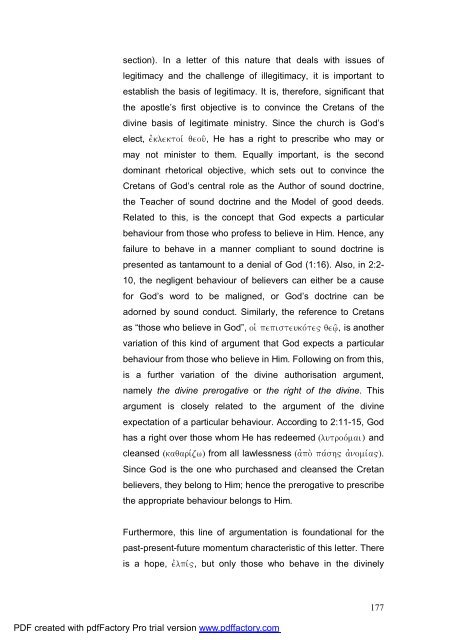A Text centred rhetorical analysis of Paul's Letter to Titus
A Text centred rhetorical analysis of Paul's Letter to Titus
A Text centred rhetorical analysis of Paul's Letter to Titus
You also want an ePaper? Increase the reach of your titles
YUMPU automatically turns print PDFs into web optimized ePapers that Google loves.
section). In a letter <strong>of</strong> this nature that deals with issues <strong>of</strong><br />
legitimacy and the challenge <strong>of</strong> illegitimacy, it is important <strong>to</strong><br />
establish the basis <strong>of</strong> legitimacy. It is, therefore, significant that<br />
the apostle’s first objective is <strong>to</strong> convince the Cretans <strong>of</strong> the<br />
divine basis <strong>of</strong> legitimate ministry. Since the church is God’s<br />
elect, ejklek<strong>to</strong>iv qeou', He has a right <strong>to</strong> prescribe who may or<br />
may not minister <strong>to</strong> them. Equally important, is the second<br />
dominant <strong>rhe<strong>to</strong>rical</strong> objective, which sets out <strong>to</strong> convince the<br />
Cretans <strong>of</strong> God’s central role as the Author <strong>of</strong> sound doctrine,<br />
the Teacher <strong>of</strong> sound doctrine and the Model <strong>of</strong> good deeds.<br />
Related <strong>to</strong> this, is the concept that God expects a particular<br />
behaviour from those who pr<strong>of</strong>ess <strong>to</strong> believe in Him. Hence, any<br />
failure <strong>to</strong> behave in a manner compliant <strong>to</strong> sound doctrine is<br />
presented as tantamount <strong>to</strong> a denial <strong>of</strong> God (1:16). Also, in 2:2-<br />
10, the negligent behaviour <strong>of</strong> believers can either be a cause<br />
for God’s word <strong>to</strong> be maligned, or God’s doctrine can be<br />
adorned by sound conduct. Similarly, the reference <strong>to</strong> Cretans<br />
as “those who believe in God”, oiJ pepisteukovte" qew`/, is another<br />
variation <strong>of</strong> this kind <strong>of</strong> argument that God expects a particular<br />
behaviour from those who believe in Him. Following on from this,<br />
is a further variation <strong>of</strong> the divine authorisation argument,<br />
namely the divine prerogative or the right <strong>of</strong> the divine. This<br />
argument is closely related <strong>to</strong> the argument <strong>of</strong> the divine<br />
expectation <strong>of</strong> a particular behaviour. According <strong>to</strong> 2:11-15, God<br />
has a right over those whom He has redeemed (lutroovmai) and<br />
cleansed (kaqarivzw) from all lawlessness (ajpo; pavsh" ajnomiva").<br />
Since God is the one who purchased and cleansed the Cretan<br />
believers, they belong <strong>to</strong> Him; hence the prerogative <strong>to</strong> prescribe<br />
the appropriate behaviour belongs <strong>to</strong> Him.<br />
Furthermore, this line <strong>of</strong> argumentation is foundational for the<br />
past-present-future momentum characteristic <strong>of</strong> this letter. There<br />
is a hope, ejlpiv~, but only those who behave in the divinely<br />
PDF created with pdfFac<strong>to</strong>ry Pro trial version www.pdffac<strong>to</strong>ry.com<br />
177

















